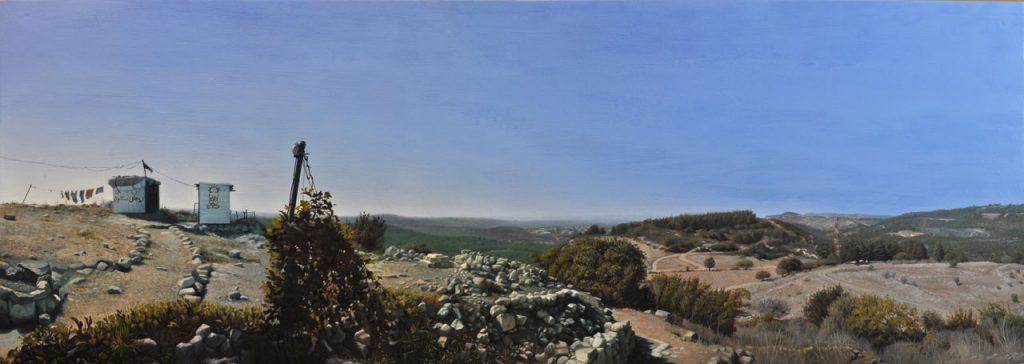(For English, Please Scroll Down)
∞ 交易地帶 IV ∞ 歸返之生命覺察:在巴勒斯坦╱以色列藝術與人類學的協作實驗
時間:2019.04.26(五)7-8:30pm
地點:台北當代藝術中心 TCAC (台北市大同區保安街49巷11號1樓,近捷運大橋頭站)
本座談呈現 Kiven Strohm 近期計畫,由許芳慈主持。
在過去十年中,當年輕一輩的巴勒斯坦人開始重返他們父母與祖父母原居的田地和村落,他們也開始意識到眼前這個他們從未經歷過的感知世界。野生的薩塔(za’atar)氣味、微風吹撫過土地的聲音以及石頭和樹木的故事,都是透過他們父母與祖父母中介而來的二手經驗,迄今為止他們從未親身經歷過這些感受。本次講座將分享一個正在進行中的計畫,藉著這群出生於他方而重返故土的巴勒斯坦人的參與,發想一個感知╱物質的世界,這計畫是一項人類學家和藝術家的協作工作,為這些歸返的巴勒斯坦人創造一個實驗的空間,好能推敲關於他們的未來或是那些還未來到的可能。
關於講者:
Kiven Strohm是一位文化人類學家,研究興趣橫跨社會科學和人文,包含當代藝術 (社會介入和參與式藝術)、協作與實驗民族誌、美學╱政治、本體論與新唯物主義以及思辨人類學。他以中東為其研究的重點區域(巴勒斯坦╱以色列和埃及),近來,也逐漸將重心放在東南亞。他目前正在著手撰寫一本名為 《生命中的實驗:巴勒斯坦╱以色列晚期殖民中的藝術和政治》的專書。
關於主持:
許芳慈於新加坡國立大學社會科學所亞洲文化研究課程獲博士學位,他的博士論文研究獲新加坡總統獎學金與新加坡國立大學人文社會科學院潛力青年研究獎助,研究興趣為冷戰美學的現代性視覺考研,記憶政治之於動態影像的關聯性。
*本座談將以英文進行,並提供中文口譯。
∞ 交易地帶 IV ∞ :以二手經驗交換感知
TCAC 2019 年將以「交易地帶」(Trading Zone)串連點狀活動,試圖在挖掘不定期與偶發的點狀活動中蘊含著隱而未現的關聯。引用自科學哲學家彼得‧加里森(Peter Galison)提出的「交易地帶」,該理論提出不同領域的人在進行知識交換時,如同說著不同語言的人在進行貿易行為。而「交易地帶」則是不同領域的人達到區域性協調的地帶。這不單是空間指向的概念,也是知識在局部領域內得以交換與各取所需的象徵。
第四回合的交換,我們思考人類學與藝術攜手並進的可能。思考遺失的經驗與記憶是否能夠重新被物質化與感知。
圖片版權:Michael Halak, “Iqrit” (Oil on panel), 2015.
∞ Trading Zone IV∞ The Sensible Life of Return: Collaborative Experiments in Art and Anthropology in Palestine/Israel
Time: 2019.04.26 Fri. 7-8:30pm
Venue: Taipei Contemporary Art Center (1 Fl, No.11, Lane 49, Baoan Street, Datong District, 10346 Taipei)
This event presents Kiven Strohm‘s recent project, and is moderated by Fang-tze Hsu.
As a younger generation of Palestinians have started to return to the lands and villages of their parents and grandparents over the last decade, they have come to acknowledge a sensible world for which they have no immediate experience. The smell of wild za’atar, the sound of the breeze roaming the land, and the stories of trees and rocks are all experiences handed down by their parents and grandparents, heretofore unavailable to their own sensible life. This presentation is about a project-to-come that attends to these returns and the sensible/material worlds being invented. It is about the making of a collaboration between an anthropologist and an artist to create an experimental laboratory for Palestinians returning to their former lands and villages for speculating about their futures or what is yet to come.
* The event will be in English, with mandarin translation/ interpretation.
Speaker:
Kiven Strohm a cultural anthropologist with interests across the social sciences and humanities, including contemporary art (socially-engaged and participatory art), collaborative and experimental ethnography, aesthetics/politics, ontology and new materialisms, and speculative anthropologies. He has a regional focus on the Middle East (Palestine/Israel and Egypt) and, more recently, Southeast Asia. He is presently working on a book project entitled, Experiments in Living: Art and Politics in Late Colonial Palestine/Israel.
Moderator:
Hsu Fang-Tze holds a Ph.D. in Cultural Studies from the National University of Singapore. Her dissertation research, Cold War Acousmêtre: Artist Films and the First Island Chain, was supported by the President’s Graduate Fellowship and the FASS Promising Graduate Scholar Award. Her research interests include contemporary knowledge formation, Cold War aesthetics, memory, philosophies of technology, and the embodiment of artistic praxis in everyday life.
Trading Zone 4: Trading indirect experience with sensation
In 2019, TCAC will connect the happenings with the thematic idea “trading zone,” uncovering the hidden interdependence in between. Proposed by scholar Peter Galison, trading zone is often to denote the new language that is formed in the expertises among different disciplines. It is not only a metaphor for a physical space, but also how and where the knowledge to exchange and be built among different disciplines and practices.
In the fourth exchange in Trading Zone, we explore the perspective collaborations between art and anthropology. How are we going to materialize and sense those indirect experience and memories?
Image: Michael Halak, “Iqrit” (Oil on panel), 2015.

